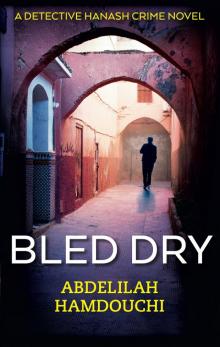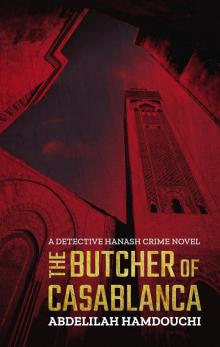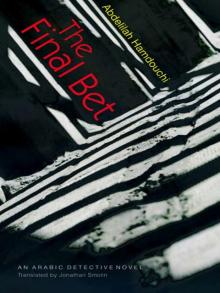- Home
- Abdelilah Hamdouchi
The Butcher of Casablanca
The Butcher of Casablanca Read online
Born in Meknès, Morocco, in 1958, Abdelilah Hamdouchi is one of the first writers of police fiction in Arabic and a prolific, award-winning screenwriter of police thrillers. He is the author of Whitefly (2016) and The Final Bet (2016) and his novels have been translated into English, French, and other languages. He lives in Rabat, Morocco.
The Butcher of Casablanca follows Bled Dry (2017) as the second book in the Detective Hanash Crime Series.
Peter Daniel, a long-term resident of Egypt, has worked as a teacher of Arabic as a foreign language and an Arabic-to-English translator for many years.
The Butcher of Casablanca
Abdelilah Hamdouchi
Translated by
Peter Daniel
This electronic edition published in 2020 by
Hoopoe
113 Sharia Kasr el Aini, Cairo, Egypt
One Rockefeller Plaza, New York, NY 10020
www.hoopoefiction.com
Hoopoe is an imprint of the American University in Cairo Press
www.aucpress.com
Copyright © 2020 by Abdelilah Hamdouchi
Protected under the Berne Convention
English translation copyright © 2020 by Peter Daniel
All rights reserved. No part of this publication may be reproduced, stored in a retrieval system, or transmitted in any form or by any means, electronic, mechanical, photocopying, recording, or otherwise, without the prior written permission of the publisher.
ISBN 978 977 416 968 7
eISBN 978 161 797 981 1
Version 1
1
He hummed a favorite tune as he went about his gruesome chore. When he was finished, he arranged the body parts in two garbage bags. Then he cleaned the floor, showered, and put on a change of clothes. He stretched out on the bed, lit a cigarette, and took a deep, delicious, triumphant puff. He had eliminated the thing that had been ruining his life and now all he had to do was to dispose of it.
His eyes darted back and forth apprehensively as the street narrowed to a cramped alleyway. He’d begun to imagine ghosts lurking in the darkness. He felt a surge of anger. He knew the source of his fear was the nauseating odor of decaying flesh assaulting his nostrils.
He jerked to a halt, extracted a cigarette from his pocket, and lifted the lighter to the tip, as if smoking would help him lug the bags. He changed his mind, picked up the bags, and lurched forward, wheezing heavily as he peered nervously into the dark recesses.
He had selected this spot after thorough research. It was in a calm, sparsely inhabited neighborhood far from where he lived. More importantly, there was a huge dumpster that never seemed to be completely full, unlike in other neighborhoods where the dumpsters quickly filled to overflowing and garbage bags were heaped around them.
He rolled the two bags into the bin, making sure they settled at the very bottom so they would be the last things the waste pickers ferreted through. As his fears evaporated, his face relaxed into an enigmatic smile. He cast a smug look around him, congratulating himself on how perfectly he had carried out his plan. There was no doubt about it. He was intoxicated with his victory.
Detective Hanash was in the garden with his German shepherd, Kreet—a “police dog,” as the breed is called in Morocco—who could see through walls and whose thunderous bark caused young and old to jump in fear. Hanash unhooked the leash, leaving Kreet free to approach the bowl containing the chow Hanash prepared himself from leftovers mixed with chicken broth. The dog cast Hanash a grateful look, acknowledging his special effort, and attacked his food.
Naeema looked out from her bedroom window on the second floor and called down to her husband to hurry up and get ready. Her voice carried an extra dose of rebuke because she knew that if left to his own devices he would spend all day with his beloved Kreet. How he loved to play with that dog! He never tired of watching him frolic, or of trying to keep up with the dog as he darted back and forth.
“That’s enough now! Come in and get dressed,” she cried impatiently.
She had laid out his favorite gray suit on the bed. It was just right for the pleasant weather. She’d spent a long time ironing his shirts, folding his clothes, and arranging everything in the suitcase. She was so excited, constantly muttering to herself, her eyes welling with tears of joy. How could she be otherwise? She had just received the news, in the early hours of the morning, that her daughter Atiqa had given birth to her second child—a son this time, as she’d hoped. Also, the delivery had gone smoothly with no need for a caesarean, unlike the first time.
This joyous news happened to coincide with a weekend, meaning they could travel up to Marrakesh to visit Atiqa. Naturally, Naeema would have preferred to be with her daughter during the delivery but it had occurred more than a week earlier than they had calculated. Not that this worried her, because Atiqa was surrounded by her husband’s family and had the kindest care and attention.
Hanash was just as thrilled and eager to get on the road. He now had a grandson! He had to be frank with himself and acknowledge that he hadn’t been very enthusiastic about visiting his daughter the last time, when she gave birth to a girl. He would never forget how overjoyed he was when his wife gave birth to their son, Tarek, after bearing two daughters. He could not conceal how happy he was that his third child was a boy. It wasn’t that he was averse to girls. He just felt that a father and son understood each other better. It was all about understanding, not about liking or disliking.
As he walked into the room, his wife shot him an appraising glance, put her hand to his forehead, and sighed. “You’re all sweaty again!”
Naeema was desperate. She wanted to get on the road and out of the city as soon as possible. Hanash knew what she was thinking. She, like he and the rest of the family, feared that the telephone would ring at any moment, bearing the news of a crime and summoning Hanash to report to work immediately. Naeema had lost count of how many times this had happened. It happened when they tried to visit Atiqa after her first baby was born, and it happened during Naeema’s last pregnancy, when he was called in to work just as she went into labor.
Manar, who shared her mother’s fear, shouted, “I’m ready!” from the open door of her bedroom, and clapped her hands to encourage the others to get a move on.
“It’s too early!” That was Tarek’s grouchy voice coming from beneath his covers in his bedroom. “It’s not even six yet. I haven’t had to get up this early for ages.”
Naeema opened the door to his room without knocking and responded with the irrefutable plea: “What if disaster strikes and your father gets called in to work? We’ll never be able to leave.” By “disaster” she meant a murder, of course.
“God forbid,” Manar said. “As I said, I’m ready.”
Tarek’s room was a picture of anarchy. Clothes spilled from his open closet. An empty Coke bottle, a half-empty bag of potato chips, some French detective novels, and a jumble of papers were cluttered around his computer on his desk. His backpack, which should have been packed already, lay in a corner, empty. Naeema’s eyes flashed as she took all this in.
“Is this the room of someone who plans to graduate from university and enroll in the police academy?” she cried in an exasperated voice. Tarek quickly sat up and smiled gently at his mother. Encompassing the room with a sweep of his hand, emulating his celebrated detective father, he said, “If you look carefully, Mom, you’ll see method in this chaos. Think of it as a room where a crime occurred. You have to look at all these things as though they’re clues.”
His sister appeared beside his mother at his bedroom door and sneered down at him. She hated it when they spoke in police jargon at home. They’d nickname people after notorious criminals. Instea
d of saying, “I’m looking for something,” they’d say, “I’m trailing the target.” And rather than “I understood,” it was “Ten-four!” or “Copy that.” When they called out for their father, it was always “Hanash,” his nickname from the force. And they called some of the neighbors “snitches.” No one in this house ever said what they meant. They always left it to others to puzzle it out.
Hanash finished dressing, came out into the hallway, and barked his orders without looking at them, just as he did when ending a meeting at the department: “To your stations!”
They took up their positions in the car, which stood at the front door. Hanash reached for the ignition, then stopped and whispered in an affected way, “Damn! I almost forgot.”
He got out of the car and rushed back into the house. Naeema’s face tautened. She restrained herself from crying out in protest. If she got into a quarrel with him, it would only cause more delay.
From the back seat, Tarek said, “He didn’t forget anything. He went back to change the hiding place of his gun. I bet he’ll stuff it between the clothes in the dresser instead of locking it in the safe.”
Manar shrugged indifferently. “He plans everything in bad faith.”
Naeema swung around in her seat. “Don’t speak about your father that way!”
“The defendant is guilty until proven innocent,” Tarek put in mischievously.
Naeema quickly checked his wisecracking. “That was how it was in the Years of Lead. Today, with human rights, things are different. A person is innocent until proven guilty.”
When she turned to face forward again, she saw her husband hastening toward the car. She breathed a sigh of relief and glanced down at her watch. “It’s six thirty. We’ll get to Marrakesh by ten.” She smiled. “We’ll be there in time to have breakfast with them.”
Now in his fifties, Detective Hanash had only a few years left until retirement. Everything about him indicated that he had spent the greater part of his life interrogating thieves, forcing murderers to confess, and unraveling crimes. His real name was Mohamed Bineesa, but everyone called him Hanash—“the Snake”—because of how fast he could change his skin and strike.
Hanash would describe himself as a veteran from the generation of police officers whose careers spanned two eras. In Hanash’s case, the “old era” was known as the “Years of Lead.” It was the period when the Interior Ministry reigned supreme. The “Mother Ministry” they called it. It presided over a nadir for human rights. To go into a police station was to become “lost” and to come out was to be “reborn.” Torture and abuse of power caused dozens of deaths per year. These were invariably chalked up to “suicide” or “natural causes.” There were no checks or inquiries. Family members received the bodies of the “deceased” and buried them in silence without a word of protest. There were no legal avenues they could pursue, and should they attempt to file a complaint, events would take as nasty a turn as they had for the relatives they had just interred.
“The accused is guilty until torture proves him innocent,” was the police motto in those grim days. Police stations were equipped with all the necessary instruments for the purpose. Some were primitive, such as the “falqa,” or bastinado, whereby the soles of a victim’s feet are raised, immobilized by binding the ankles to poles, and then subjected to repeated thrashing, leaving the victim unable to walk for days. Variants involved electric shocks or hanging the victim by his feet until the skin flayed. Then there was the horrifying “tayyara,” the airplane—the technique of keeping a victim suspended until he eventually went mad.
There was a vast gulf between the “truth” in the depositions that illiterate suspects were forced to sign with a thumbprint and the actual crimes or delinquencies they allegedly committed. The literate, for their part, affixed their signatures in writing to fabricated confessions after varying degrees of physical and psychological coercion. Therefore, it would not be inaccurate to say that a significant portion of the prison population consisted of innocent people.
The judiciary in those days functioned by remote control, while dates of arrest were manipulated so that some detainees could enjoy police hospitality for endless months before seeing a courtroom.
Yet, there were people who hailed this situation as a great achievement and a service to society. It rid the country of criminals so you could roam the streets till dawn with no fear of harm. Repression in exchange for security: the ideal system for reducing crime rates. The criminal knows exactly what he risks before venturing to commit a crime: death under torture inflicted merely to force him to confess to stealing a wallet, or because he failed to pay a bribe when arrested as drunk and disorderly, or because he’d had the audacity to stand up to the police or even to attempt to flee. The most vicious criminal could be transformed into a police informant in exchange for simple services or payoffs after being let loose to engage in petty theft without causing physical harm or injury.
Given the state of public rights, it was sufficient, from a political standpoint, to be a “good citizen”—meaning never reading books or purchasing opposition newspapers, never tuning in to foreign radio channels, and being content with official news broadcasts, minding your own business and never sticking your nose into places it didn’t belong, keeping all curiosity about what was happening in the world around you in check, never criticizing and only praising, always returning home early in the evening so as to avoid being picked up by a police patrol (with or without cause); in short, never doing anything that might bring you into contact with the police—in order to live safely and securely, and to die in peace.
Detective Hanash had spent about half his career in the “old era.” He started out as a simple security guard, on his feet up to eighteen hours a day. Driven by poverty, deprivation, and an inferiority complex, he persevered until he was promoted to officer, inspector, and then detective. Over the course of twenty years he worked in all departments and was posted to several cities. It was in Tangiers, where he headed the crackdown on hashish smugglers, that he acquired both his wealth and his fame. It was an experience that he would always picture as a radiant monument emitting a golden gleam.
And now he lived in a villa in the center of Casablanca, a sturdy building from the colonial era when villas were grand, with high ceilings, spacious rooms, and balconies that overlooked lush gardens.
The transition to the “new era” was a permit to cross the threshold into the twentieth century. The reforms which were taken to absorb political tensions would subsequently fortify the state against the waves of havoc and devastation unleashed by that season known as the “Arab Spring.” Virtually overnight, prisons disgorged their political detainees and millions of dirhams worth of compensation was paid out beneath the rubric of “equity and reconciliation.” In a demonstration of its skill in waging revolution against itself, the Moroccan regime appointed as prime minister a former left-wing opposition leader who had been sentenced to death in absentia.
In a short time everything changed. “The plushest offices are now occupied by former political detainees” went a commonly told joke about the many who had moved from putrid cell to air-conditioned office.
The reforms precipitated a total metamorphosis in the country’s political life, and an independent press burgeoned. But the greatest problem for the police in “new era” was that, at first, they didn’t know how to function without the familiar tools. Police stations were ordered to remove all torture equipment and put up signs saying “The police are at your service.” They now had to respect the limitations of provisional detention and free suspects without obtaining confessions or other information that had been won so easily with the usual methods. Generally (in the old era), suspects received their first beatings on their way to the police station, where they would be treated with slaps, kicks, and curses before being subjected to the falaqa, tayyara, electric shock, and other such treatment at the hands of the official torturers, after which they would confess to crimes they never com
mitted or that they intended to commit in the future. Now, investigators had to interview suspects as though they were VIPs, write up depositions promptly, and exert immense effort to persuade suspects to sign them, which they might refuse merely because they didn’t like the wording. Those influenced by American TV shows would even insist that they be read their rights and demand a lawyer.
With the end of the era of repression in exchange for security, the element of fear was gone and crime proliferated. The police insisted they were working as hard and dedicatedly as they could. But human rights meant they could not extract confessions by force and democracy meant they could not force an answer on a suspect.
It took some time and retraining before the situation improved. Meanwhile, the numbers of deaths due to torture in prison dwindled to almost zero and, moreover, some of the most notorious “executioners” were prosecuted. Undoubtedly, abuses still existed, but they were no longer systematic as was the case in the past.
Detective Hanash had experienced the transformation and had been part of it. He too had to change with the times. In the “old era,” especially when he was stationed in Tangiers and his work brought him in contact with hash-smuggling circles, he had raked in substantial sums. Now he only accepted gifts of high symbolic value. Moreover, ever since moving to Casablanca, his workload had doubled. It had also grown more difficult, now that all his old “executioner” friends had been put out to pasture.
The criminals of the “new era” were not only fearless, they were craftier. Armed with knowledge of police investigations and examination procedures, they destroyed evidence and laid false clues to lure police into an inextricable maze.
Hanash devised a system of his own to come to terms with the “new era.” A major component was the dozens of confidential informants or “CIs”: the snitches and squealers on whom he showered token rewards, in exchange for which information reached him faster than lightning. He had CIs in the media and cultural worlds, in all the notorious neighborhoods, in business and political circles, in bars, brothels, nightclubs, and even deserted areas. There was not a single unsolved case on Hanash’s record, thanks to his network of spies that spanned all social strata.

 Bled Dry
Bled Dry The Butcher of Casablanca
The Butcher of Casablanca The Final Bet
The Final Bet Whitefly
Whitefly